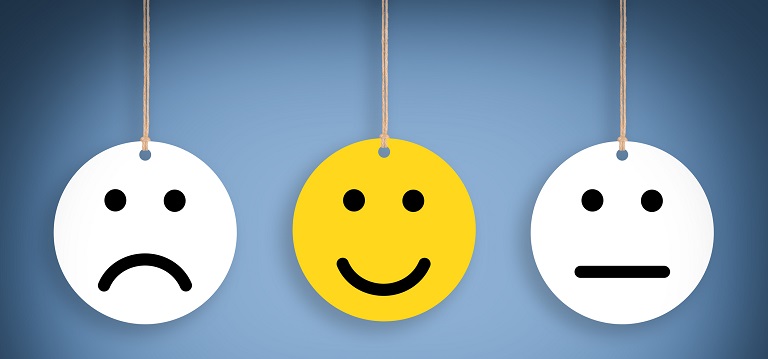Take this What Is My Mood Quiz to find out. We update the quiz regularly and it’s the most accurate among the other quizzes.
EMOTION AND MOOD
Moods are more than just emotions. Moods cause changes in thought, judgment, behavior, and basic bodily functioning. In reality, mood disorders are not emotional problems. Emotions are adaptive reactions to life; all emotions are normal in their own right. People suffering from a mood disorder lose the ability to see their feelings in context and act intelligently in the face of them.
Mood disorders actually damage the connection between the emotional and action centers of the brain. Because these two regions of the brain are so closely linked, our actions and judgments are always influenced by our emotions (this is why we aren’t like machines!). When a mood disorder disrupts the connection, people may act excessively rapidly (as in mania) or not act at all (as in depression). The blue line in the image below depicts this connection:
The blue lines connect the limbic/amygdala system – the emotional core – to the frontal/cortical system – the action, planning, and judgment center.
AWARENESS AND MOOD
The region of your brain that makes you aware of yourself is also located around the forehead. Some feelings, such as self-consciousness or anxiety, or the self-critical guilt of depression, can make us uncomfortably aware of ourselves. Other states, like alcohol, can reduce our awareness of ourselves. Elevated mood states include mania, hypomania, and mixed states.
Elevated moods are uncommon at doctors’ offices because they obscure our self-awareness. Nonetheless, studies have revealed that recognizing them is crucial to healing from depression, even if they occurred a long time ago.
To help you recognize high moods, we’ve created two rating systems that allow your friends and family to share their observations of your moods. You can also learn more about heightened states by clicking here.
What Is My Mood Quiz
EMOTIONAL DISORDERS
Mood disorders are labeled differently depending on the moods that occur, how severe they become, and how they evolve over time. Obtaining the correct diagnosis is a vital step in determining the appropriate treatment. Also, you must try to play this What Is My Mood quiz.
Examples of mood disorders (for more information, click the title):
Major Depressive Disorder
A melancholy or empty feeling that lasts for at least two weeks. It may happen only once or again throughout one’s life. It may fade away completely or continue at a low level.
Dysthymia
A low-grade depression or empty feeling that lasts at least two years. This might range from a temperament to a disorder.
Cyclothymia
Mood swings that occur frequently and last only a short time. Any of the following emotions may occur, but the most common is a depressed or empty mood followed by an agitated or irritated mood. This, like dysthymia, can be a temperament or, if severe enough, a disorder.
Bipolar-II
In this condition, depressed or empty moods prevail, yet there are also intervals of modestly increased mood (called hypomania). This illness is fairly prevalent (affecting one out of every thirty persons), although it is frequently misunderstood as serious depression.
I am bipolar (Manic-Depression)
Extremely elevated moods alternate with depressed or empty moods (called mania).
About the quiz
Spectrum Bipolar
This category includes persons who have depression as well as other moods, but not to the extent that they would qualify for bipolar-I or II. It can detect persons who appear to be depressed but do not respond well to medicines. People with bipolar spectrum disorder frequently have relatives who have full-blown bipolar disorder.
CHANGES IN MOOD
Rapid cycling (at least 4 cycles per year), ultra-rapid cycling (at least 2 cycles per month), and ultradian cycling are all diagnoses for how quickly your mood changes (cycling up and down within a day).
WORDS OF HOPE
I hope you remember that you are not your sickness, and that a mental disorder may be a source of strength. People who recover from depression frequently discover a newfound appreciation for life and a greater compassion for the world around them. Despite its bleakness, depression has been shown in studies to provide people with a more accurate sense of reality. Bipolar disorder patients have better language skills, social ability, and inventiveness.
Those suffering from mood disorders are among the most creative, talented, and hardworking people in our society. Great leaders like Abraham Lincoln and Winston Churchill are among them, as are artists and authors like Georgia O’Keeffe, Mark Twain, and Irving Berlin, as well as performers like Robin Williams, Carrie Fisher, and Ben Stiller.
For more personality quizzes check this: Winx Club Quiz – Which Character Are You?




